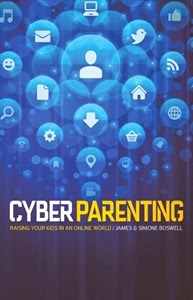Raising Tech-Healthy Humans, Daniel Sih (2023)
Maybe you’re excited about the creativity technology offers—your kids design amazing things on Minecraft, or learn to code and play cooperatively with their friends. Maybe it’s a helpful extra babysitter—allowing dinner to be prepared, a bit more work to be done, or just allowing a breather for a moment.
For many parents, all of these things are true, all at the same time! We know that technology has benefits and risks, so we’re trying to figure out a way forward in this screen-saturated world. However, charting that path sometimes feels more like floundering. Questions abound around when to let a child have a phone, what boundaries are needed, how to manage screen time and so on.
Daniel Sih has written a very helpful, succinct and practical book helping parents to think through the main issues and then implement practices that promote healthy tech use. Raising Tech-Healthy Humans is aimed at parents of primary-aged children and under and is designed to be read in less than two hours. It will still have benefit for parents of younger teenagers, but many of these decisions are now being made long before that age. Sih is clear that the book is not aimed at parents whose teenagers are already addicted to their phones, although those willing to re-examine their household’s choices would likely still find much of benefit.
Sih sets the scene with three parenting philosophies that shape tech-healthy parenting. Firstly, we are raising adults, not children. So, our long-term goal is to train them for the real world, able to cope with the challenges of adult life, ‘building their character muscles for when they need them most’ (p. 6).
Secondly, we need to prioritise healthy brain development, particularly higher brain skills of thinking, processing and planning. Our lower brain systems are important for emotional responses as well as impulses and reactivity; they provide safety systems when we’re in danger (for example, the ‘flight or fight’ response). But the problem with technology is that it overstimulates the lower brain: ‘electronic media has a significant role in causing children to enter a state of hyperarousal, leading to chronic stress in the developing brain’ (p. 13). This is why kids are so grumpy when the screens turn off—they’re super-activated and full of adrenaline. This can then impede the development of higher brain function. Sih draws a distinction between passive and interactive media, which he terms ‘lean back’ or ‘lean forward’ technologies, encouraging more ‘lean back’ options, such as television. We all instinctively spot this difference— everyone’s usually satisfied at the end of an episode of Lego Masters but when you turn off Fortnite mid-game, uproar ensues!
Thirdly, Sih suggests that limits are essential and in fact, life-giving. He considers both screen time and content limits, as well as creativity with how you control or enable tech time in your home.
Next, Sih builds on these principles and offers practical strategies to set your kids up well for a lifetime of healthy tech use. He calls this the ‘STARTER’ framework:
- Start with self: consider your own tech habits and make changes where necessary.
- Take it slow when adopting tech. Sih busts the three prominent myths parents fall for regarding when to get their children various technology: safety, it will stop the nagging and that it’s educational.
- Age-appropriate tech that can be ‘graded up’ as they grow up—with suggestions about digital contracts, filtering and parenting controls.
- Regularly talk about tech and how your kids experience it—what they like, what they don’t like—and share in their interests.
- Tech-healthy rhythms are important for families, including tech-free times (especially meals, sleep and car trips).
- Encourage tech-free adventures and family time—provide a better alternative to what the screen offers.
- Rely on others: parent in community and help each other out with these issues.
The version of the book I read was a ‘Christian parenting special edition’. I suspect very little was different from the original version, besides the addition of a preface and Bible verses at the beginning of each chapter. The preface encourages us to view this issue through a more biblical lens. Tech can create a massive idol, tempting us and confronting us with our sinful desires to be in control, to be always available, to seem important, to want to impress others and to promote ourselves.
So, if you have younger children and are struggling to know how to chart a healthy family path in the tech space, Raising Tech-Healthy Humans is a great book to help you out. In addition, let’s take Sih’s advice and be communities that talk about how we use tech, how we make decisions about it, and where we struggle. Let’s walk alongside one other, as we all seek a healthy balance:
‘Let’s enjoy the best of the online world but not be diminished by too much technology, and raise a generation of healthy, faith-filled kids who love God and love others in beautiful, life-giving ways.’ (p. xv)
This review first appeared on Growing Faith.
I was given a copy of this book in exchange for an honest review.









